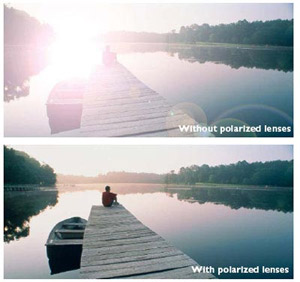For two people who look totally different, my husband and I actually have very similar face shapes. We both have narrow faces and our eyes are close together, so we tend to look good in the same shapes of sunglasses. I can get away with wearing just about any of his glasses, and he could wear most of mine except mine have correction and sometimes rhinestones. He’s not big on rhinestones!
The one thing we disagree on most however, is polarized lenses. He won’t buy a pair of sunglasses without polarization, and I won’t buy them with. He loves wearing them when he plays basketball, or is being generally outdoorsy because they cut down on the glare. I, on the other hand find them disorienting and have always thought they make colors look strange.
The Technical Details
Polarized lenses are designed to increase visual perception by reducing the amount of glare that gets in your way when it’s bright. Technically speaking polar light comes from horizontal waves, which is what creates glare. In order to reduce or neutralize the glare on water and shiny or light colored objects, polarized lenses have a protective layer that uses vertical light filters so they can cancel out horizontal light.
If you’re wearing polarized lenses, the only light waves coming through the applied filters are vertical, not horizontal. Vertical light is what you need to be able to see things in daylight. The horizontal rays basically get trapped in the vertical filters and reduce the presence of reflections.
Polar Pluses
Aside from the technical stuff, there are plenty of advantages to polarized lenses that my husband insists on, and I understand his points.
Glare? What Glare?
 First, glasses like the Flying Fisherman Maverick cut down on the glare coming off of water. My husband loves to fish, so polarized glasses help him see through the water on very bright days.
First, glasses like the Flying Fisherman Maverick cut down on the glare coming off of water. My husband loves to fish, so polarized glasses help him see through the water on very bright days.
Second, options like the Maui Jim Kanaha also help reduce the glare coming off of cars while you’re driving, and they improve on the lack of precision that sometimes comes from regular sunglasses.
Sporting Stability
They’re good for sports because they reduce the amount of light interference that comes from playing outside, so passing cars and reflective objects won’t blind you. Glasses like the Spy Optic Dirk (reviewed here) help clarify the difference between real things and glare-related optical illusions.
Polar Sadness
I have always wanted polarized sunglasses to work for me because I have gotten many headaches over the years due to glare from any of the above. My migraines begin after being exposed to bright light, so I figured these would be the solution. For some reason though, I just don’t do well with them and they make me a little dizzy when I wear them.
No Screens
Other than occasional disorientation which people may suffer from, polarized lenses are not so technology friendly. The coverage on the lenses actually makes it difficult to read LCD screens. This means you can’t use your phone and wear your glasses at the same time, although I have to say this also depends on the brand and make. As a self-proclaimed mobile phone addict, this would make me crazy. I need to be able to see my phone at a glance without a lot of shuffling.
Not For The Skies
Another thing I learned is polarized lenses can be bad for airplane pilots despite the fact that so many of the modern “aviator” glasses come with polarized lenses. The screens on instruments in airplanes are usually polarized already, so wearing sunglasses with the same coating can make vision worse.
Polarization Is Your Choice, But The Fields Are Divided
From what I can gather, polarized sunglasses are a “love it or leave it” option. People who love sunglasses usually have pretty strong opinions on the matter, and if my husband and I are any indication, this is totally true. That being said, there are plenty of people who do really well with them because they have a need for precision and glare reduction. Fisherman in general can really benefit.
I may give them a try again and test out some different options because of the headaches I get, so I’m not discounting polarization just yet.


